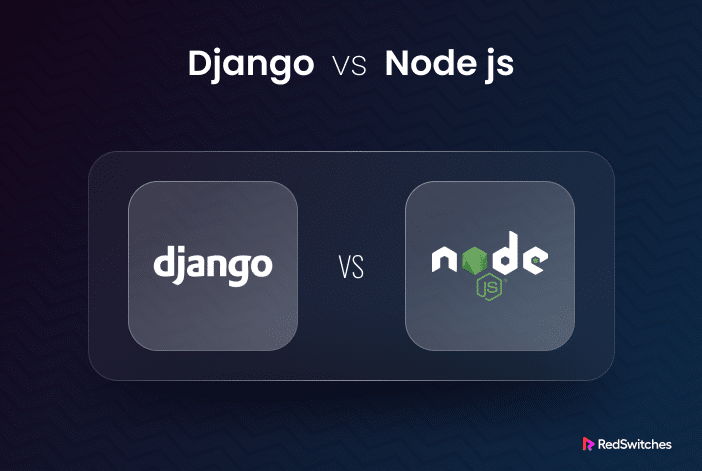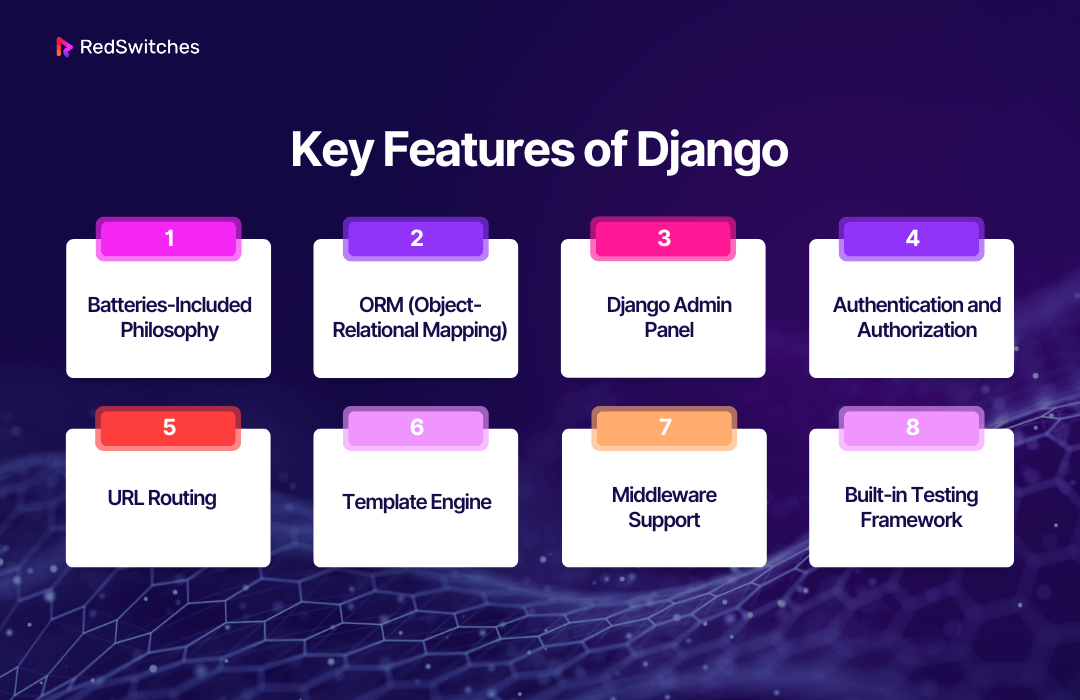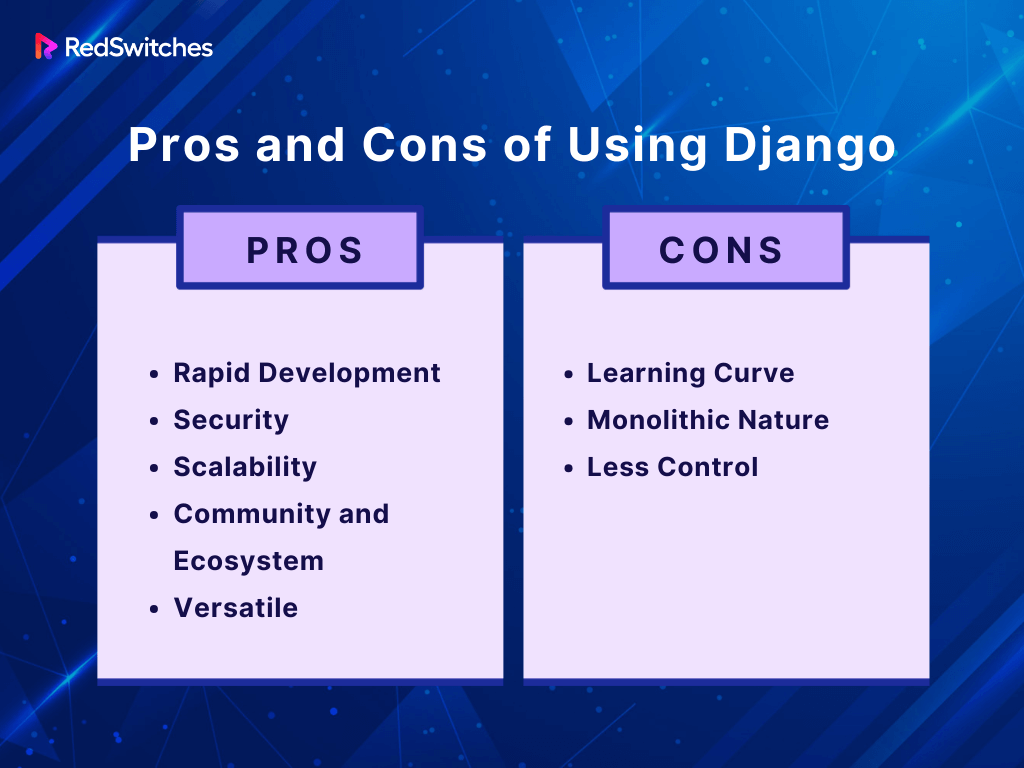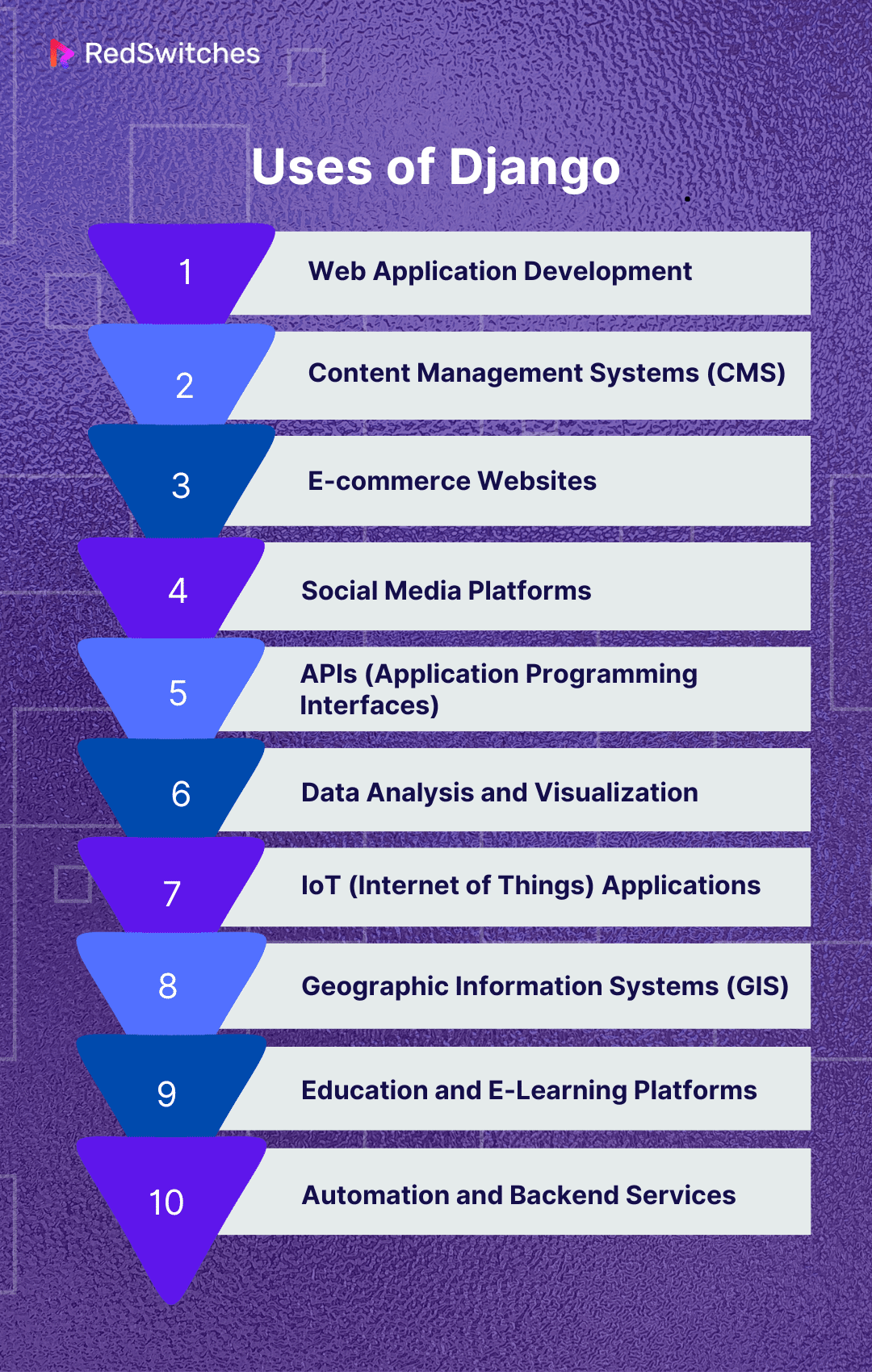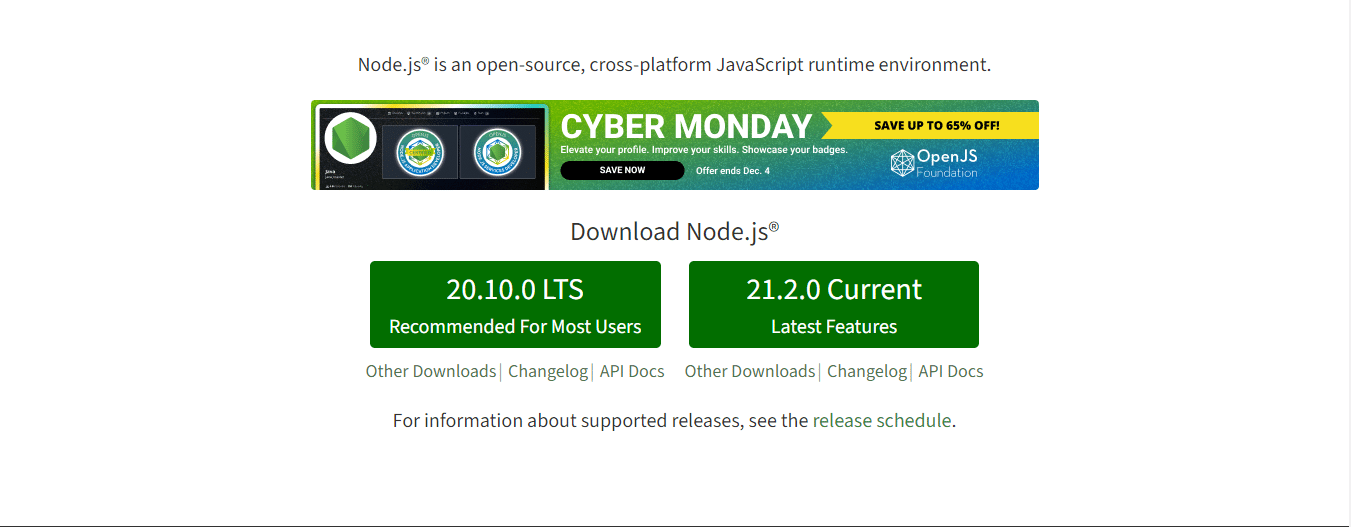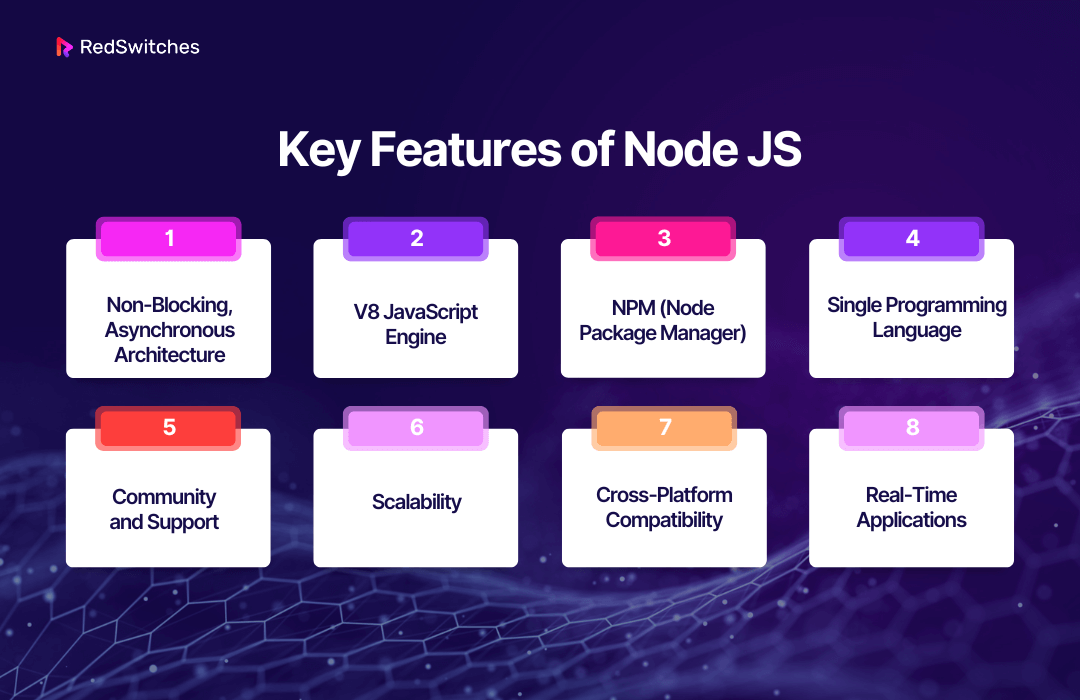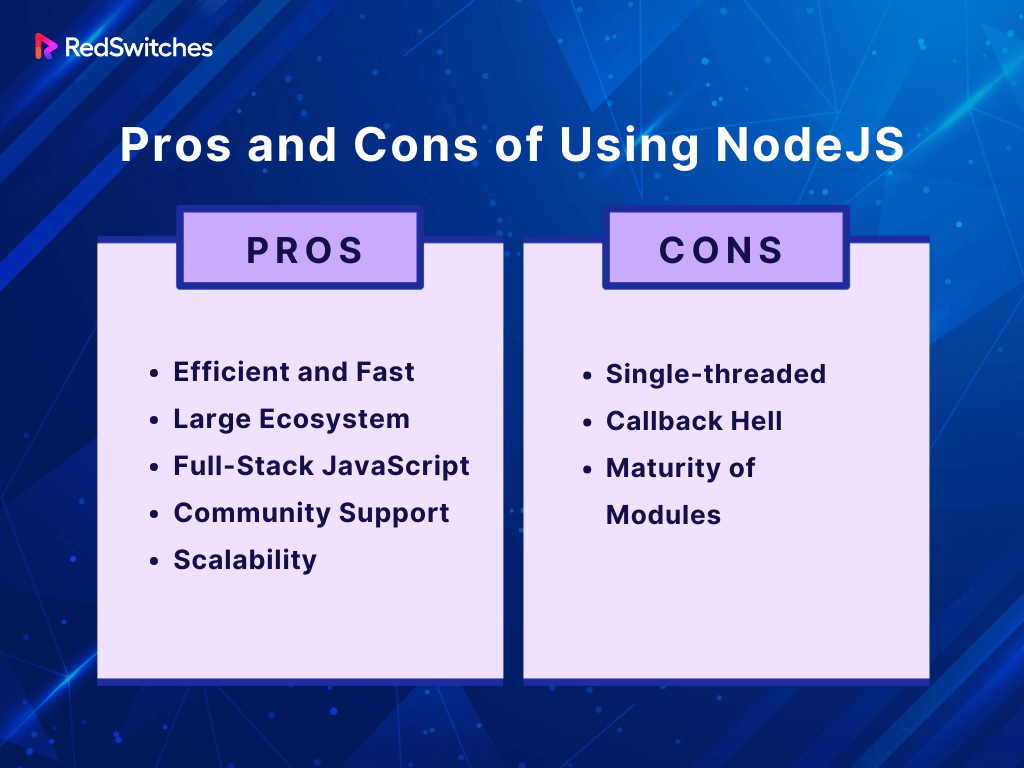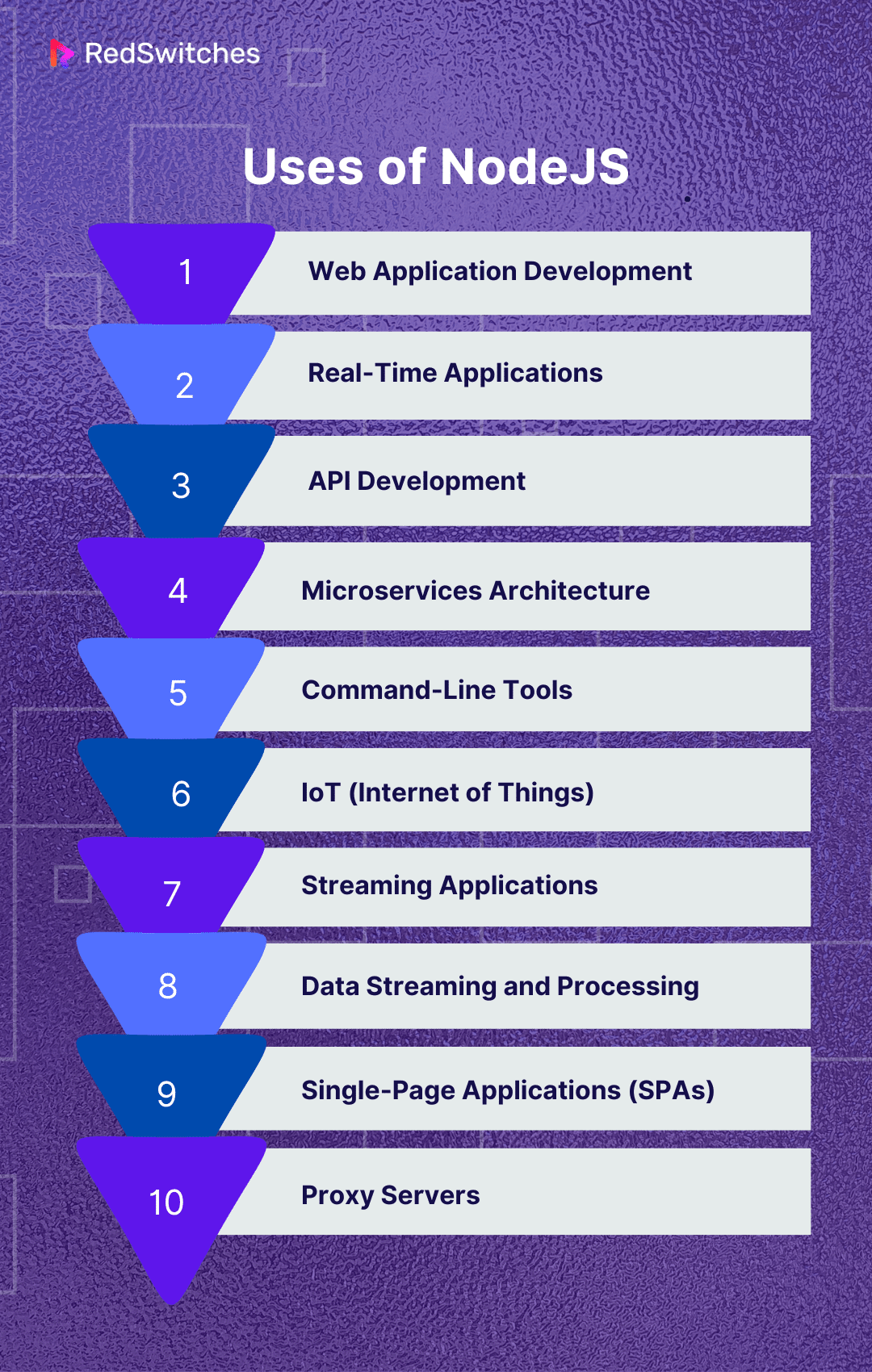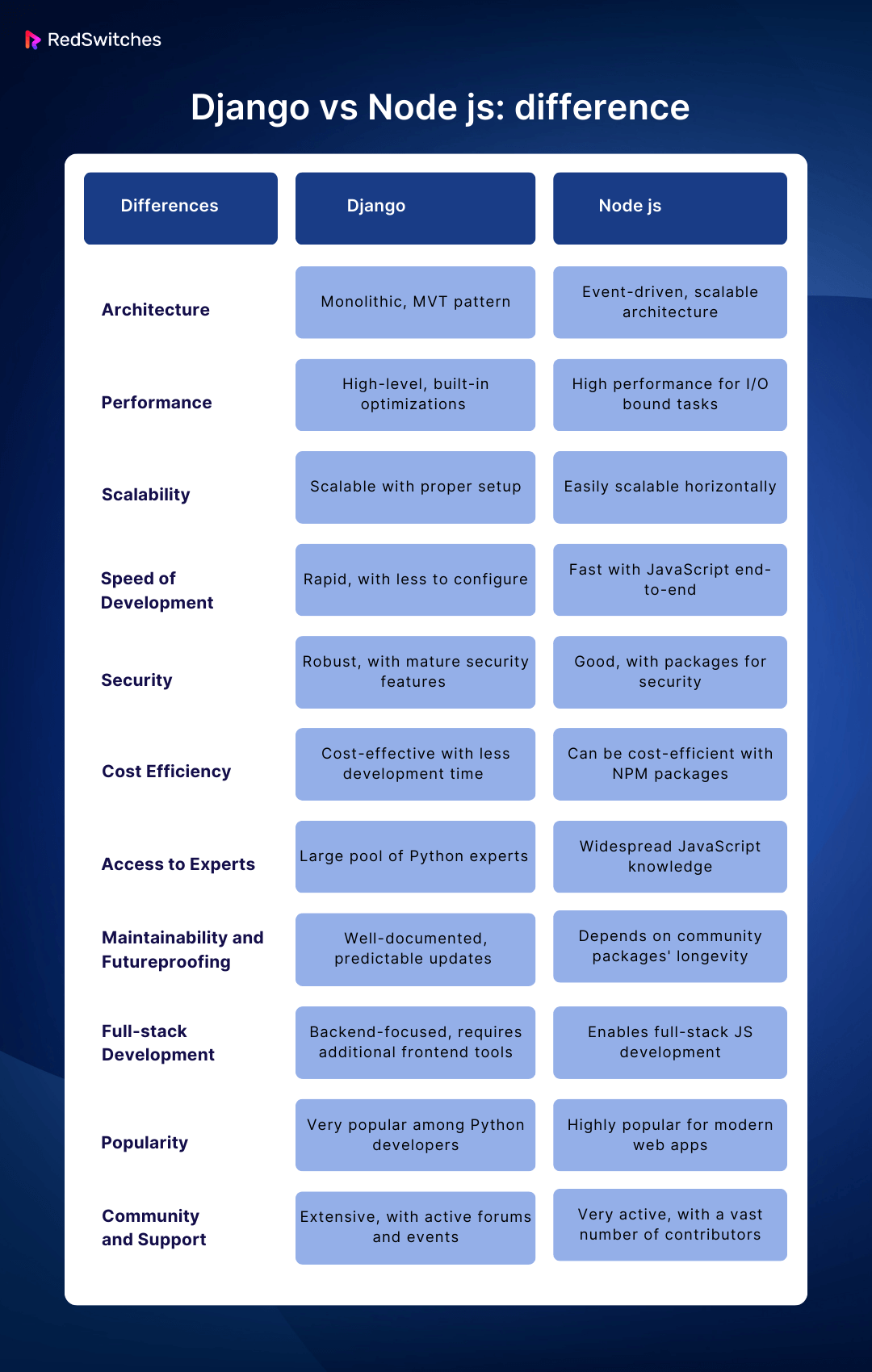Choosing the right technology stack is crucial for the success of any project. Regarding web development technologies, two popular options often find themselves in the spotlight: Django and Node.js. Both offer unique features and capabilities that can significantly impact your web application’s scalability, performance, and development process.
According to Statista, Node.js ranks first among web frameworks and is used by approximately 47.12% of web developers globally, whereas Django ranks in the 13th position at 11.47%.
While statistics point toward Node.js as the best web framework, it is important to understand that it may not be suitable for all developers. In some use cases, Django may offer more benefits for some developers. This makes it critical to compare both frameworks, Nodejs vs Django, to determine which, between Django or Nodejs, is ideal for them.
In this comprehensive comparison, we’ll explore Django vs Nodejs, dissecting their strengths, weaknesses, and ideal use cases. Whether you’re an experienced developer or just getting started, you’ll clearly understand which framework aligns best with your project’s needs by the end of this blog. So, let’s get started by exploring Django vs Nodejs in detail.
Table Of Contents
- What is Django?
- What is NodeJS?
- Node vs Django: Top Differences and Comparison
- When to Use Django?
- When to Use Node JS?
- Conclusion – Django vs Node js
- FAQs
What is Django?
Credits: Django Website
Before we dive into the Django nodejs comparison, it is essential to understand the definitions of both web development frameworks.
Django is a high-level, open-source web framework for building web applications quickly and efficiently. It follows the MVC (Model-View-Controller) architectural pattern, although it’s commonly referred to as MV in Django. Django provides a robust and structured foundation for developers to create web applications by emphasizing reusability, rapid development, and the ‘Don’t Repeat Yourself’ (DRY) principle.
It includes many built-in features and modules, including an Object-Relational Mapping (ORM) system for database interactions, an authentication system, a powerful admin panel, and a templating engine. Django’s extensive documentation, active community, and many third-party packages make it popular for web developers looking to speed up their development process and build scalable and maintainable web applications.
Key Features of Django
1. Batteries-Included Philosophy
Thanks to its ‘batteries-included’ philosophy, Django has many built-in features and libraries that simplify common web development tasks. The framework also provides solutions for many essential functionalities, from handling authentication and URL routing to managing databases and form processing. This feature allows developers to focus on writing application-specific code instead of reinventing the wheel.
2. ORM (Object-Relational Mapping)
Django’s powerful Object-Relational Mapping (ORM) system allows developers to interact with the database using Python objects instead of raw SQL queries. This feature makes database management more intuitive and helps prevent common security vulnerabilities like SQL injection. Django’s ORM supports multiple database engines, ensuring flexibility in choosing the right backend for your project.
3. Django Admin Panel
Django includes an admin panel that can be easily customized to create an intuitive and user-friendly interface for managing application data. Developers can quickly scaffold an admin interface for their models, making adding, editing, or deleting records easy. This feature is particularly beneficial for content management systems and data-driven applications.
4. Authentication and Authorization
Django offers powerful security tools for handling user authentication and authorization. Developers can easily implement user registration, login, and password reset functionalities. Django’s built-in permission system allows fine-grained control over who can access specific application parts, enhancing security and data protection.
5. URL Routing
Django’s URL routing system simplifies the mapping of URLs to views, making it easier to create clean and maintainable URLs for your web application. The URL dispatcher can handle complex URL patterns, parameter capturing, and redirection, allowing for dynamic and user-friendly URLs.
6. Template Engine
Django has a notable template engine that separates the presentation layer from the application’s logic. This feature enables developers to create dynamic and maintainable HTML templates, promoting code reusability and maintainability. Templates support template inheritance, custom template tags, and filters, making it easy to generate dynamic content.
7. Middleware Support
Django’s middleware architecture allows developers to insert processing logic at various stages of request handling. This feature is invaluable for authentication, request/response modification, and error-handling tasks. Middleware components can be customized or extended to meet specific application requirements, enhancing flexibility.
8. Built-in Testing Framework
Testing is a crucial aspect of software development, and Django provides a robust testing framework that simplifies the process of writing and running tests. Developers can create test cases for various parts of their application, ensuring its reliability and functionality throughout its lifecycle. Automated testing in Django is efficient and helps catch potential issues early in development.
Also, Read Node.js and npm Installation Made Easy: Windows and Linux Edition.
Pros and Cons of Using Django
Pros
- Rapid Development: Django’s high-level abstractions and built-in features, such as the Object-Relational Mapping (ORM) system and the Django Admin, allow developers to create web applications quickly. This accelerates the development process, making prototyping and delivering projects on time easier.
- Security: Django takes security seriously and provides built-in protection against common web vulnerabilities like SQL injection, Cross-Site Scripting (XSS), and Cross-Site Request Forgery (CSRF). Features like automatic escaping of content and authentication systems help developers build secure applications by default.
- Scalability: Django is designed to handle scalability challenges effectively. It supports using distributed databases, caching mechanisms, and load balancing, allowing applications to grow seamlessly as traffic increases. Many high-traffic websites and applications rely on Django’s scalability features.
- Community and Ecosystem: Django’s community is vast. This community contributes to an extensive ecosystem of third-party packages and libraries, providing solutions for various needs, from authentication to content management. This ecosystem accelerates development by reducing the need to reinvent the wheel.
- Versatile: Django is a versatile framework suitable for various web applications, from simple blogs to complex, data-driven platforms. Its modularity allows developers to choose and integrate components as needed, making it adaptable to different project requirements.
Cons
- Learning Curve: While Django’s high-level abstractions can accelerate development, they can also create a steeper learning curve for newcomers to web development. Understanding the framework’s concepts and best practices may take time for those without prior experience.
- Monolithic Nature: Django tends to promote a monolithic approach to application architecture, which may not be suitable for all projects. Microservices or smaller, decoupled components sometimes better fit certain modern development paradigms.
- Less Control: Django’s opinionated design and conventions can limit flexibility and control, especially for experienced developers who prefer to make low-level decisions. Customizing certain aspects of the framework may require working against its defaults, which can be challenging.
Also Read: Frameworks: Django vs Laravel – A Comprehensive Comparison in Web Development
Uses of Django
When deciding between Django vs Nodejs, understanding the cases can offer valuable insight into your best choice. Below are the use cases of Django:
1. Web Application Development
Django is most commonly associated with web application development. It has many built-in tools and libraries for handling tasks like URL routing, database management, user authentication, and more. This makes it ideal for building web applications of all sizes and complexities.
2. Content Management Systems (CMS)
Many popular Content Management Systems, like Wagtail and Mezzanine, are built on top of Django. These CMS platforms provide user-friendly interfaces for managing website content, making it easy for non-technical users to update and maintain websites.
3. E-commerce Websites
Django can be used to build robust and secure e-commerce platforms like Saleor and Oscar. Its flexibility allows developers to create custom shopping cart functionality, integrate payment gateways, and manage product catalogs effectively.
4. Social Media Platforms
Building a social media platform from scratch can be complex. Django simplifies this task by providing tools for user profiles, friend requests, notifications, and more. The Pinax ecosystem offers pre-built components for social networking websites.
5. APIs (Application Programming Interfaces)
Django Rest Framework (DRF) is a powerful toolkit for building web APIs. It’s widely used for creating RESTful APIs that can serve as backends for mobile applications, single-page apps, and other web services.
6. Data Analysis and Visualization
Django can also be used for data-driven applications. Developers can integrate libraries like Pandas and Matplotlib to process and visualize data. Combining Django with these tools allows for creation of data dashboards and reporting systems.
7. IoT (Internet of Things) Applications
Django’s ability to handle real-time data and its support for WebSocket communication make it a suitable choice for building IoT applications. It can collect, process, and display data from IoT devices.
8. Geographic Information Systems (GIS)
Django’s GIS framework, in conjunction with libraries like GeoDjango, allows developers to build location-based applications. This is especially useful for projects involving maps, geospatial data, and location-based services.
9. Education and E-Learning Platforms
Django’s robustness makes it an excellent choice for building educational platforms and e-learning systems. It can handle user authentication, course management, quizzes, and progress tracking.
10. Automation and Backend Services
Django can be used to build custom automation tools and backend services that streamline business operations. This includes task scheduling, data processing, and integration with other services.
Are you contemplating between Python and PHP? Read our informative blog, ‘Python vs PHP: How To Choose The Best Language For Your Projects?‘ to streamline the decision-making.
What is NodeJS?
Credits: Nodejs Website
Node.js is an open-source, server-side JavaScript runtime environment allowing developers to execute JavaScript code outside a web browser. Ryan Dahl created it and first released it in 2009. Node.js is built on the V8 JavaScript engine from Google Chrome, making it highly efficient and performant.
One of the key features of Node.js is its non-blocking, event-driven architecture, which enables it to handle multiple concurrent connections efficiently. This makes it particularly well-suited for building scalable and real-time applications like web servers, chat applications, and APIs.
Node.js has a vast ecosystem of packages and libraries available through its package manager, npm (Node Package Manager), simplifying the process of adding functionality to applications. This rich ecosystem and its speed and versatility have contributed to Node.js’s popularity among developers for a wide range of web and network applications.
Also Read: How to Install node.js on Debian: 3 Simple Methods
Key Features of NodeJS
1. Non-Blocking, Asynchronous Architecture
Node.js is built on an event-driven, non-blocking I/O model, allowing it to handle multiple concurrent connections efficiently. This asynchronous nature ensures that Node.js applications can perform tasks without waiting for one operation to finish before starting another. This results in faster, more responsive applications, making it an excellent choice for real-time applications like chat applications and online gaming.
2. V8 JavaScript Engine
Node.js utilizes Google’s V8 JavaScript engine, renowned for its speed and performance. V8 compiles JavaScript directly into machine code, making Node.js lightning-fast in executing code. This engine is constantly improved and updated, ensuring Node.js stays at the forefront of JavaScript runtime performance.
3. NPM (Node Package Manager)
NPM is a package manager bundling with Node.js. It is the world’s largest ecosystem of open-source libraries, with thousands of modules readily available for your projects. NPM simplifies dependency management, making installing, updating, and managing packages easy, enhancing code reusability and collaboration.
4. Single Programming Language
Node.js allows developers to use JavaScript on a web application’s client and server sides. This unification of programming languages simplifies development, as developers can share code between the front-end and back-end, reducing the need to context-switch between different languages.
5. Community and Support
Node.js boasts a booming community of developers who actively contribute to its growth. This large and passionate community provides ample resources, documentation, and support for newcomers and experienced developers. The Node.js community continually introduces new features, improvements, and best practices.
6. Scalability
Node.js is designed for scalability, making it suitable for building large-scale applications that handle many concurrent connections. Its event-driven architecture and non-blocking I/O enable developers to create efficient, scalable systems easily.
7. Cross-Platform Compatibility
Node.js is cross-platform, allowing developers to write code on one platform and run it on multiple operating systems, including Windows, macOS, and various flavors of Linux. This portability simplifies development and deployment, reducing compatibility issues.
8. Real-Time Applications
Node.js excels at building real-time applications due to its event-driven, non-blocking nature. It’s commonly used for building chat applications, online gaming platforms, and collaborative tools that require instant data updates and low latency.
Do you want to learn how to install Nodejs on Ubuntu? Read our informative guide, ‘Three Simple Ways You Can Install Node.js On Ubuntu 22.04.’
Pros and Cons of Using NodeJS
Pros
- Efficient and Fast: Node.js is built on the V8 JavaScript engine, which compiles JavaScript code to machine code, resulting in high performance. It uses non-blocking, event-driven I/O, making it suitable for handling numerous concurrent connections. This efficiency makes it a preferred choice for building scalable web applications.
- Large Ecosystem: Node.js has an extensive list of open-source libraries and packages available through npm (Node Package Manager). This extensive collection simplifies development by providing pre-built solutions for various tasks, reducing development time and effort.
- Full-Stack JavaScript: Node.js allows developers to use JavaScript for server- and client-side programming. This full-stack capability promotes code reuse, simplifies development, and fosters collaboration between front-end and back-end developers, resulting in a more cohesive development process.
- Community Support: Node.js features a growing community of enthusiasts and developers. This community-driven ecosystem empowers developers to find answers to their queries, access tutorials, and receive support from a vast network of Node.js users, making problem-solving and learning easier.
- Scalability: Node.js is known for efficiently handling many simultaneous connections. Its non-blocking architecture allows it to scale quickly by adding more servers or utilizing technologies like load balancing, making it well-suited for building real-time applications and microservices.
Cons
- Single-threaded: Node.js runs on a single thread, which can become a bottleneck for CPU-bound tasks. While it excels at handling I/O-bound operations asynchronously, CPU-intensive operations can block the event loop, potentially impacting the performance of other requests.
- Callback Hell: When handling asynchronous operations in Node.js, developers often encounter nested callbacks, leading to callback hell or the ‘pyramid of doom.’ This can make the code harder to read and maintain. While there are solutions like Promises and async/await to mitigate this issue, it still requires careful handling.
- Maturity of Modules: Although Node.js has an extensive ecosystem of modules and packages, not all are equally mature or well-maintained. Developers must be cautious when selecting packages, as the quality and stability of third-party modules can vary, potentially leading to compatibility issues or security vulnerabilities in applications.
Uses of NodeJS
When deciding between Django vs NodeJS , understanding the use cases can offer information on which web development framework best fits your needs and requirements. Below are the use cases of Nodejs:
1. Web Application Development
Node.js is well-known for building server-side web applications. It’s particularly suitable for creating lightweight, high-performance web servers and APIs. Developers often use popular frameworks like Express.js to streamline web development, making Node.js an excellent choice for projects of all sizes.
2. Real-Time Applications
Node.js’s event-driven nature makes it an ideal platform for building real-time applications like chat applications, online gaming platforms, and collaborative tools. The WebSocket protocol support and libraries like Socket.io simplify the implementation of real-time features.
3. API Development
Node.js excels in building RESTful APIs. With Express.js and other frameworks, you can quickly create robust APIs for your applications, making communicating between client and server easier.
4. Microservices Architecture
Node.js is well-suited for microservices-based architectures. Its lightweight and scalable nature makes it a solid choice for developing individual microservices that can be easily integrated into a more extensive system.
5. Command-Line Tools
Developers often use Node.js to build command-line tools and scripts for various tasks. The availability of npm (Node Package Manager) and a vast library of modules simplifies the development and distribution of these tools.
6. IoT (Internet of Things)
Node.js can be employed in IoT applications to interact with hardware devices and sensors. Its flexibility allows developers to create IoT solutions that collect and process data efficiently.
7. Streaming Applications
Node.js’s ability to handle streaming data makes it ideal for building applications that process and transmit media content like video and audio. Developers can leverage libraries like ffmpeg to manipulate multimedia files.
8. Data Streaming and Processing
Node.js is excellent for handling large volumes of data in real-time. Its non-blocking, event-driven architecture makes it suitable for data processing tasks, like log analysis, real-time analytics, and streamlining data from IoT (Internet of Things) devices.
9. Single-Page Applications (SPAs)
Node.js can serve as a backend for SPAs, offering efficient data retrieval and routing. When combined with a front-end framework like React or Angular, it provides a seamless experience for users.
10. Proxy Servers
Node.js can act as a reverse proxy server, load balancer, or API gateway. Tools like Nginx can be complemented with Node.js to manage incoming requests and distribute them to various backend servers.
Now that we have discussed the definitions, key features, pros and cons, and use cases of Django vs NodeJS, let’s explore the differences between Django vs Nodejs.
Also Read An Introduction To Database: Types, Understanding DBMS & More.
Node vs Django: Top Differences and Comparison
Comparing the differences between Django vs Nodejs can simplify the decision-making process of those confused between the two web development frameworks.
Below are the top 11 differences between Django vs Nodejs:
Architecture
Below is a comparison of the difference between Django vs Nodejs in terms of architecture:
Django
As stated above, Django follows a ‘batteries-included’ technique. It’s a full-stack web framework that includes everything needed to build a web application: an ORM, routing, templates, authentication, and more. The framework follows the MVT architecture, a variation of the MVC architecture.
Nodejs
Nodejs doesn’t prescribe any specific architecture. It allows developers to build their applications in any way they see fit, using any available frameworks like Express.js for routing and middleware support. Node.js applications are often built using a microservices architecture, especially when utilizing frameworks like NestJS or Meteor.
Performance
Below is a comparison of the difference between Django vs Nodejs in terms of performance:
Django
Django uses Python as its language. Python has a reputation for being slower than JavaScript. Django’s ORM and middleware can simplify data handling and development. This can contribute to helping increase overall development speed.
Nodejs
Nodejs is known for high performance due to the non-blocking I/O and the V8 JavaScript engine that compiles JavaScript to machine code. This can result in faster server-side operations, particularly for I/O-bound applications.
Scalability
Below is a comparison of the difference between Django vs Nodejs in terms of scalability:
Django
Django can scale well with the right setup, but it might require more effort to scale for handling several simultaneous connections compared to Node.js. Django’s monolithic architecture could make it more challenging to scale horizontally.
Nodejs
Created with a focus on scalability, Nodejs’s non-blocking event loop allows it to handle many simultaneous connections easily. This, combined with its lightweight nature, makes it ideal for microservices architectures, which are inherently scalable.
Speed of Development
Below is a comparison of the difference between Django vs Nodejs in terms of speed of development:
Django
Django offers many ready-made components that expedite development. This framework enables developers to concentrate on crafting unique product features without worrying about the common functionalities that come pre-built with Django.
Nodejs
Node.js promotes rapid development through its expansive npm library and the ability to reuse code across the client and server sides. Asynchronous programming and managing callbacks may introduce complexities that can affect development speed.
Credits: Unsplash
Security
Below is a comparison of the difference between Django vs Nodejs in terms of security:
Django
Django includes built-in security features that help developers avoid common issues like SQL injection, cross-site request forgery, and clickjacking. Its user authentication system provides a secure way to manage user accounts and passwords.
Nodejs
While Node.js doesn’t have as many built-in security features as Django, the vast npm ecosystem includes numerous packages for enhancing security. The onus is on developers to implement these packages correctly and maintain security measures.
Cost Efficiency
Below is a comparison of the difference between Django vs Nodejs in terms of cost-efficiency:
Django
Thanks to its comprehensive package of features, Django can be more cost-efficient due to its quick development turnaround and the reduced need for third-party plugins. This can lead to lower development and maintenance costs over time.
Nodejs
Node.js can also be cost-effective, particularly for startups and small businesses, due to its open-source nature and the availability of numerous free libraries. Potential costs may arise from the need to handle complex asynchronous code and the necessity to ensure proper security measures are implemented.
Access to Experts
Below is a comparison of the difference between Django vs Nodejs in terms of access to experts:
Django
Django leverages Python, one of the most popular programming languages, widely taught, and has a vast, active community. Finding developers who can work with Django is relatively easier due to the number of Python developers.
Nodejs
Node.js requires expertise in JavaScript, which also enjoys immense popularity. Node.js developers are in high demand, especially those proficient in full-stack JavaScript development, which might affect availability and cost.
Credits: Unsplash
Maintainability and Futureproofing
Below is a comparison of the difference between Django vs Nodejs in terms of maintainability and futureproofing:
Django
Django projects tend to be more uniform and thus easier to maintain due to its convention-over-configuration philosophy. It is also a mature framework with a solid track record, indicating a stable future.
Nodejs
Node.js’s non-blocking architecture can lead to callback hell if not properly managed, potentially affecting maintainability. Its thriving community and continuous updates suggest Node.js will remain relevant for the foreseeable future.
Full-stack Development
Below is a comparison of the difference between Django vs Nodejs in terms of full-stack development:
Django
Django, while primarily a backend framework, can serve both the front and back end in a web application, especially when used with templating engines. A separate front-end framework may be preferred for modern SPA or mobile applications.
Nodejs
Node.js is a go-to for full-stack JavaScript development, allowing developers to write both client-side and server-side code in JavaScript. This can significantly streamline development processes and reduce the context switching between languages.
Popularity
Below is a comparison of the difference between Django vs Nodejs in terms of popularity:
Django
Django is very popular among Python developers due to Python’s widespread use in educational sectors and its rising adoption in data science. Its popularity is bolstered by the ‘batteries included’ approach, which offers developers a full suite of tools.
Nodejs
Node.js has recently become popular due to its performance and scalability. Its use of JavaScript, the primary language of the web, also means that it’s highly popular for full-stack development.
Community and Support
Below is a comparison of the difference between Django vs Nodejs in terms of community and support:
Django
The Django community is robust, with a wealth of documentation, third-party packages, and an active developer forum. It is backed by the Django Software Foundation, ensuring long-term support.
Nodejs
Nodejs has developed a large community of developers and the globe’s largest ecosystem of open-source libraries via npm. The community offers excellent support through multiple channels, like forums, social media, and conferences.
Also Read: Learn more about web development frameworks.
Here’s a quick summary of all the differences discussed above.
When to Use Django?
Below are a few use cases where Django can serve as a suitable web development framework:
- Rapid Development: Django’s ‘batteries-included’ approach offers ready-made components for common functionalities, making it ideal for projects with tight deadlines or where development speed is a priority.
- Python’s Popularity: Leveraging the widespread use of Python, Django is a perfect match for projects in academic, scientific, and data-driven fields.
- Structured Approach: If you need a clear structure for your project, Django provides it, reducing the time spent deciding its architecture.
- Vast Community: The large and active community around Django ensures a wealth of resources, support, and pre-built packages to extend the functionality of your application.
- Complex, Database-Driven Websites: Django’s ORM and admin interface are powerful tools for applications requiring robust data models and management.
Credits: FreePik
When to Use NodeJS?
Below are a few key scenarios where Nodejs fits as the ideal web development framework:
- Real-time Applications: Nodejs is ideal for chat apps, online gaming, or collaboration tools due to its event-driven architecture.
- Microservices: The web development framework is perfect for decomposing a complex app into simple, decoupled microservices, enhancing flexibility and scalability.
- Data-Intensive Applications: Nodejs is great for apps that require handling numerous I/O operations or streaming large amounts of data.
- JSON APIs: Since JavaScript is used on both the client and server side, Node.js is a good fit for handling JSON APIs.
- Single Page Applications (SPAs): Node.js can efficiently serve the dynamic content needed for SPAs.
- Cross-platform Development: Use Node.js to develop desktop applications with frameworks like Electron.
Conclusion – Django vs Nodejs
When deciding between Django vs Node.js, the choice depends on your specific requirements. Each framework comes with its own set of strengths and weaknesses, making them suitable for different scenarios. Django’s high-level abstractions and rich ecosystem make it an excellent choice for those who prioritize rapid development. If you seek maximum flexibility, real-time capabilities, and a JavaScript-centric environment, Node.js has you covered.
Regardless of your choice, remember that a robust hosting platform is vital for your web applications’ optimal performance and stability. That’s where RedSwitches comes in. With our top-notch services, you can easily deploy your Django or Node.js applications, ensuring they run smoothly and securely.
So, whether you opt for Django’s elegance or Node.js’s versatility, RedSwitches has your back. Make the right choice, harness the power of these frameworks, and elevate your web development journey to new heights.
Ready to embark on your web development journey? Explore our services now.
FAQs
Q. Is Django better than Node?
When comparing Django vs Nodejs in terms of which is better, it is important to understand whether Django is better than Node.js depending on the project requirements. Django is a high-level Python web framework focusing on the ‘batteries-included’ philosophy, whereas Node.js is a JavaScript runtime environment efficient for event-driven, non-blocking servers.
Q. Which is better, Python or NodeJS?
Comparing Python and Node.js is not straightforward as Python is a programming language, often used with frameworks like Django for web development. At the same time, Nodejs is a runtime environment for executing JavaScript on the server side.
Q. Can Django replace NodeJS?
Django cannot directly replace Nodejs because they operate in different programming environments; Django is a framework in Python, while Node.js allows for JavaScript server-side execution. If Python is preferred, Django can be an alternative to Node.js frameworks for web development.
Q. What is the difference between Django and Node.js?
Django is a high-level Python web framework that encourages rapid development and clean, pragmatic design. Node.js, on the other hand, is a runtime environment that allows you to execute JavaScript code on the server side. Essentially, Django is a full-stack framework that follows the “batteries-included” philosophy, while Node.js is focused on providing a non-blocking, event-driven architecture for building scalable network applications.
Q. When should I choose Node.js over Django for my web development project?
You might consider using Node.js over Django if your project requires real-time capabilities or if you prefer to use JavaScript for both frontend and backend development. Node.js is well-suited for building flexible, efficient, and lightweight applications, particularly those involving data streaming, chat features, or collaborative tools that demand real-time updates.
Q. In what scenarios is Django a better choice than Node.js for web development?
Django is primarily suitable for projects that involve complex databases, content management systems, or rapid prototyping of web applications. It offers a robust set of features for authentication, security, and admin interface out of the box. Additionally, Django is a good fit for projects requiring extensive backend functionalities with Python language flexibility and seamless integration with various databases.
Q. Can I use both Django and Node.js in a single web development project?
Yes, it is possible to use both Django and Node.js in the same project. You can leverage the strengths of each framework by using Django for backend processing, database management, and content delivery, while Node.js can handle real-time and asynchronous operations, such as handling WebSockets, event-driven notifications, or server-side scripting for the frontend.
Q. Which companies are known for using the Django framework for their web applications?
Several prominent companies and platforms like Instagram, Pinterest, and Spotify have successfully utilized the Django framework for their web applications. These examples exemplify the scalability, robustness, and versatility of Django in handling large-scale, high-traffic web platforms.
Q. How does Express.js compare to Django in web development?
Express.js is a minimal and flexible Node.js web application framework that is often used as the backend of a Node.js web application. In contrast, Django provides a more comprehensive and ready-to-use set of features for developing complex web applications, including an administrative interface, ORM, authentication, and more. Django tends to offer a more structured and opinionated approach compared to the lightweight and flexible nature of Express.js.
Q. What are the primary differences between Django and Node.js in terms of security?
Django is well-known for its strong security features, as it provides built-in protection against common web vulnerabilities and establishes good security practices by default. Node.js, on the other hand, requires developers to be diligent in implementing security measures as it does not have as many security features out of the box. Therefore, Django is generally considered to be more secure than Node.js for web application development.
Q. How does the complexity of development projects in Django compare to those in Node.js?
Django tends to be more opinionated and structured, which can result in a more structured development process. Conversely, the flexibility of Node.js can lead to more freedom in the development process, but also requires a higher level of responsibility in architectural decisions. As a result, development projects in Django may initially appear more complex due to its comprehensive feature set, while projects in Node.js may require more initial planning and decision-making by the developers.
Q. Can both Django and Node.js handle frontend and backend development for web applications?
Yes, both Django and Node.js are capable of handling both frontend and backend development for web applications. Django templates can be used for rendering HTML and integrating with frontend frameworks, while Node.js can serve as a backend server for APIs, data processing, and real-time interaction. Depending on the specific requirements of the project, either framework can effectively manage both frontend and backend development.
Q. How does the performance of Django and Node.js compare in web application development?
While Django is known for its robustness and ability to handle complex web applications effectively, Node.js is recognized for its excellent performance in handling concurrent connections and real-time data exchange due to its non-blocking, event-driven architecture. The comparative performance of Django and Node.js heavily depends on the specific requirements and use cases of the web application being developed, with each framework excelling in different areas of web application development.
